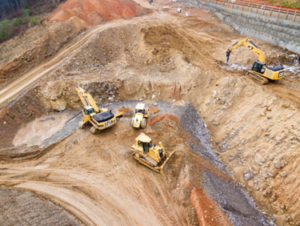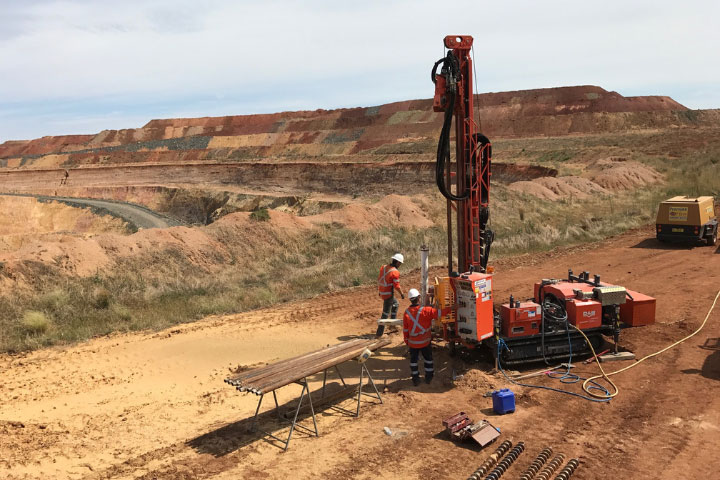The Value of Geotechnical Engineering in Dealing With Environmental Obstacles and Enhancing Construction Security
Geotechnical design works as a keystone in the crossway of environmental stewardship and construction safety and security, giving important insights into the actions of soil and rock under various conditions. This discipline not just addresses pressing ecological obstacles such as dirt erosion and groundwater defense but additionally improves the effectiveness of infrastructure against all-natural dangers. By applying calculated site investigations and customized mitigation actions, geotechnical designers play a crucial duty in securing both human lives and ecological honesty. Yet, the complexities of these challenges raise important questions regarding the future instructions of this area and its ramifications for lasting development.

Role of Geotechnical Engineering
Geotechnical design plays an important function in the style and building of infrastructure by resolving the actions of dirt and rock products under various conditions. This field of engineering is necessary for understanding the communication between frameworks and the ground, which includes identifying the load-bearing ability of dirt, analyzing security, and anticipating potential negotiation or failure.
Geotechnical engineers are accountable for performing site examinations, which involve sampling and screening dirt and rock to collect information on their chemical and physical properties. This info is crucial for creating structures, retaining walls, and various other earth-retaining structures that make sure security and longevity. Additionally, geotechnical design educates the selection of ideal building approaches and products, thereby decreasing risks connected with soil habits.
Moreover, the assimilation of geotechnical engineering principles right into city preparation and environmental management is essential for dealing with difficulties such as ground contamination and groundwater management. By recognizing geotechnical variables, engineers can develop lasting services that improve the durability of facilities versus natural threats, while additionally advertising environmental stewardship. Ultimately, the duty of geotechnical design is vital for accomplishing safe, durable, and eco conscious building methods.
Dirt Disintegration Reduction
Soil erosion postures a significant risk to both ecological stability and facilities honesty, impacting around 24 billion heaps of fertile dirt shed yearly worldwide. This sensation is worsened by variables such as logging, urbanization, and inadequate agricultural techniques. Geotechnical engineering plays a critical role in establishing reliable soil erosion reduction techniques that protect both the atmosphere and building and construction tasks.
One method requires the implementation of disintegration control techniques such as plants growing, which stabilizes dirt with origin systems. In addition, the building of preserving wall surfaces and balconies can successfully decrease surface area overflow and secure prone areas from erosion. Proper water drainage style is likewise critical; it lessens water buildup and guides excess overflow far from essential frameworks.
Additionally, geotechnical designers utilize dirt stablizing strategies, such as the application of geotextiles and naturally degradable mats, to boost soil communication and avoid degradation - geotechnical engineer description. Routine tracking and assessment of erosion-prone websites enable timely treatments, ensuring long-term sustainability. By integrating these methods, geotechnical engineering not just minimizes the influences of soil erosion but additionally adds to the durability of framework versus ecological difficulties, ultimately fostering a safer and much more sustainable constructed environment
Groundwater Defense Strategies
Groundwater acts as a vital resource for drinking water, farming, and commercial procedures, making its security essential for ecological sustainability and public wellness. Reliable groundwater defense methods are crucial in mitigating contamination threats and making sure the long life of this source.

Normal surveillance of groundwater top quality is likewise essential, enabling very early detection of contamination sources and promoting timely removal initiatives. Employing innovative innovations, such as geophysical studies and remote sensing, help in determining potential risks to groundwater reserves.
Moreover, public education and learning and stakeholder engagement are critical, cultivating neighborhood assistance for groundwater security initiatives. geotechnical specialist. By integrating governing steps, technical innovations, and community participation, we can create an extensive framework that safeguards groundwater sources while advertising lasting advancement and building and construction practices
Landslide Risk Monitoring
Landslides present substantial threats to both human security and framework, making effective risk administration approaches vital. Geotechnical engineering plays a vital role in recognizing, assessing, and mitigating landslide threats. A thorough understanding of slope stability, soil technicians, and hydrology is essential for establishing efficient threat administration strategies.
The very first step in landslide risk management entails detailed site investigations, which consist of geological mapping and soil testing. These investigations assist designers assess the capacity for landslides by identifying important variables such as incline angles, dirt composition, and water web content. Making use of innovative technologies such as remote noticing and geophysical studies can enhance the accuracy of these evaluations.
As soon as threats are recognized, proper mitigation measures can be carried out. These might include design services such as maintaining walls, water drainage systems, and incline stabilization techniques. Monitoring systems must be established to spot signs of ground motion and modifications in water levels, enabling for aggressive interventions.

Enhancing Building And Construction Security
Building and construction sites often provide a myriad of risks that can jeopardize worker safety and task stability. Geotechnical design plays an important role in boosting building and construction security by supplying vital understandings into subsurface conditions. Via detailed soil and rock evaluation, geotechnical designers can identify potential threats, such as dirt instability, groundwater concerns, and seismic susceptabilities, which might jeopardize the safety of building activities.
Carrying out geotechnical options, such as proper foundation design and the use of click over here now keeping frameworks, reduces these risks dramatically. These remedies not only make certain the security of the structures being developed yet also create a safer working environment for building workers.
In addition, cultivating a culture of safety via training and adherence to developed safety and security protocols further boosts building site safety. By incorporating geotechnical experience right into the preparation and implementation phases, building jobs can attain greater safety standards, ultimately securing workers and making certain view it now successful job completion.
Verdict
Finally, geotechnical engineering serves as a vital discipline in advertising and tackling environmental challenges building safety. Via effective soil disintegration reduction, groundwater security approaches, and landslide danger monitoring, geotechnical designers contribute to the development of resilient facilities. The combination of these practices promotes a safer building and construction environment and improves the sustainability of civil design jobs. Inevitably, the experience of geotechnical engineers is crucial in protecting both natural sources and human lives against potential dangers.
Geotechnical engineering offers as a foundation in the junction of ecological stewardship and building safety and security, providing vital understandings right into the habits of soil and rock under different conditions. Geotechnical engineering informs the selection of appropriate building methods and materials, consequently reducing dangers connected with dirt actions.
Geotechnical engineering plays an essential function in creating efficient soil erosion mitigation techniques that guard both the atmosphere and building tasks.
Furthermore, geotechnical designers use soil stablizing strategies, such as the application of geotextiles and biodegradable floor coverings, to enhance soil communication and avoid destruction. Through comprehensive dirt and rock analysis, geotechnical designers can identify prospective risks, such as soil instability, groundwater concerns, and seismic susceptabilities, which may endanger the safety of building and construction activities.